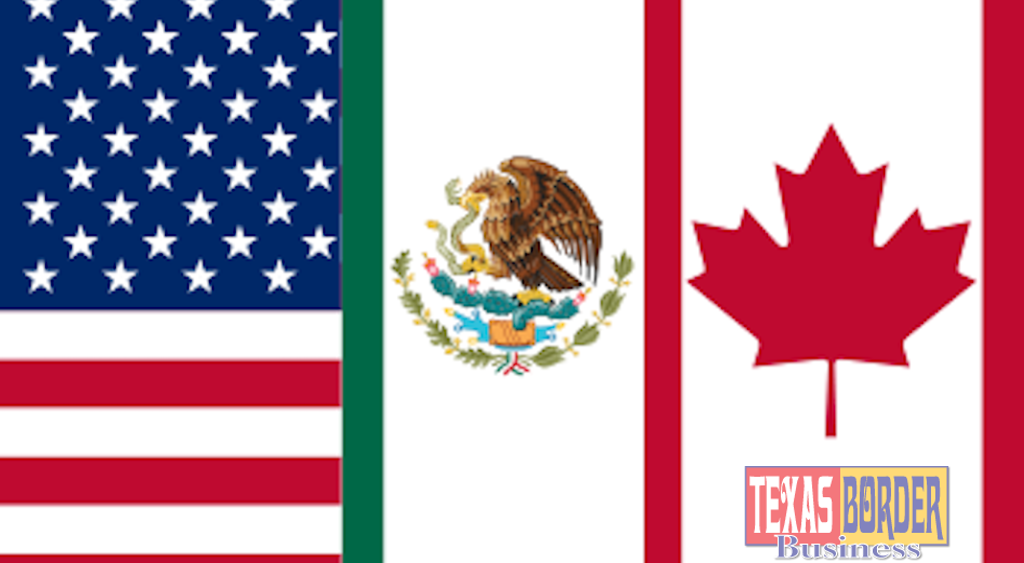
Texas Border Business
LAREDO, Texas – The Texas Border Coalition (TBC) today urged Congress to recognize the importance of trade between the U.S., Mexico
“International trade under the North American Free Trade Agreement (NAFTA) framework has been absolutely critical to the economic prosperity of the border region, the state of Texas and the entire United States,” Laredo Mayor and TBC Chairman Pete Saenz said. “We support improvements to the NAFTA framework as proposed in the U.S. Mexico Canada Agreement (USMCA).”
Saenz noted that NAFTA has increased trade and investment in North America by creating the world’s largest trade region, with more than 480 million people. U.S. trade with Canada and Mexico has nearly quadrupled to $1.3 trillion under NAFTA, and U.S. exports to Mexico have grown nearly $200 billion. Forty-three out of 50 U.S. states now list Canada or Mexico as their first or second largest export market.
Imports have risen also, contributing to growth and jobs in the American transportation and retail sectors.
According to the Wilson Center, a national non-partisan policy forum that tackles global issues with independent research and open dialogue, 40 cents out of every dollar’s worth of goods imported into the U.S. from Mexico is actually “Made in USA” content – meaning that many goods imported from Mexico incorporate U.S. content and contribute to U.S. economic growth and employment.
The U.S. and Mexico are interdependent for manufactured goods, linking the productivity and competitiveness of communities on both sides of the border – creating jobs and wealth in both countries. International trade accounts for 30 percent of the U.S. economy, and 14 million U.S. jobs depend on trade with Canada and Mexico.
The USMCA builds on the integrated supply chains that link American manufacturers with their partners across the border and proposed to improve the NAFTA framework, reduce barriers on cross-border trade and help grow the Texas and the U.S. economies by enlarging our ability to produce and sell goods abroad, thereby increasing jobs and economic growth here at home.
“Texas and our nation need trade policies that will help our economy grow,” Saenz said. “After 24 years, a newly modernized agreement will help to assure the U.S. remains competitive against other trade blocs, to preserve U.S. jobs and to discourage the outflow of capital.”
For over a decade, TBC has urged investments to reduce bottlenecks and facilitate international trade at Texas border crossings. By improving the transportation infrastructure on border trade routes, upgrading technology to make customs more efficient and hiring inspectors to minimize backups at busy border crossings, Texas and the U.S. can grow our economy with a better flow of international trade and travel.
Similarly, increased usage of certified trusted carrier programs (CT-Pact) and dedicated fast lanes would result in more economic activity and trade efficiency at Ports of Entry through. Furthermore, wait times at Border Patrol highway check points could also be reduced by increasing the number of inspection lanes, staff and installing state of the art technology.
These investments in international trade will help grow the $22 trillion North American economy that already outsizes our European and Asian competitors. Helping the American economy, jobs and wages grow by adopting the USMCA and fueling our partnerships with Canada and Mexico would send a message to the world that North America is the powerhouse of the global economy now and in the future.
“The USMCA agreement provides for clear, straight-forward rules of trade to ensure that all business, especially small to medium-sized businesses, have the opportunity to participate in the economic benefits of free trade; and provide for modernization where appropriate by adopting advances in technology and improving cross-border coordination and efficiency,” Saenz said.
















